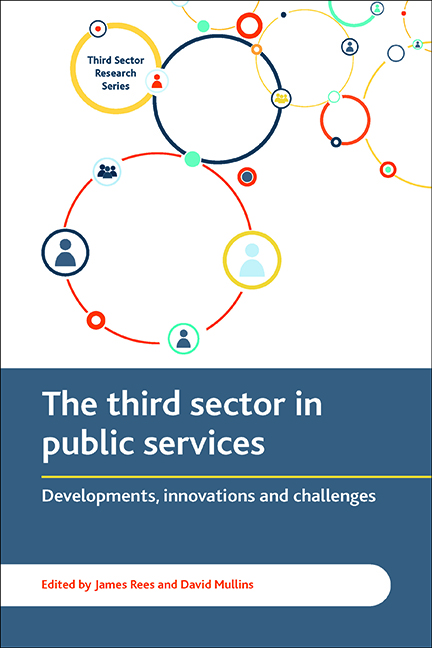Book contents
- Frontmatter
- Contents
- List of tables, figures and boxes
- Series editor’s foreword
- Notes on contributors
- one The third sector delivering public services: setting out the terrain
- Part One Policy, politics and organisations
- Part Two Cross-cutting issue for third sector service delivery
- Part Three Service delivery in key policy fields
- Index
eight - Valuing third sector achievements in a service delivery context: evaluations and social value
Published online by Cambridge University Press: 05 April 2022
- Frontmatter
- Contents
- List of tables, figures and boxes
- Series editor’s foreword
- Notes on contributors
- one The third sector delivering public services: setting out the terrain
- Part One Policy, politics and organisations
- Part Two Cross-cutting issue for third sector service delivery
- Part Three Service delivery in key policy fields
- Index
Summary
Introduction
The concept of social value has long since been used to describe the role and contribution of third sector organisations (TSOs) as social service actors. The concept has been put to the fore with the introduction of the Public Services Social Value Act (SVA) in 2012. In this chapter we make the case that evaluations can play an important role in supporting the goal of the SVA, evidencing the distinct contribution of TSOs within social welfare services, and thereby contributing to levelling the playing field for TSOs aiming to work with social welfare service delivery.
The chapter argues that evaluations of organisations and interventions can play an important, dual role in the context of TSOs as social welfare service providers. First, evaluations are rhetorical tools that promote the idea of social value creation as essential in how we value social services. The application of firm evaluation models, that builds on a clearly – albeit contextually dependent – definition of social value, can play a critical role in establishing ‘social value’ as an essential ingredient in commissioning procedures. At policy level, evaluations can support a discourse that places social value firmly within the commissioning and delivering of social welfare services, and so can serve as a rhetorical, or political, tool in debates around the purposes and principles of core social service policies such as the SVA and the Open Public Service Agenda. Second, evaluations can offer ways of illustrating and evidencing how and when social value creation takes place. At organisational level, evaluations can demonstrate the creation of social value and thereby offer organisations a competitive edge in commissioning and other similarly competitive bidding procedures.
An introductory section of the chapter provides a discussion about evaluations, followed by an outline of the SVA 2012. We look at the relationship between evaluations and the third sector in the UK, and outline the context, that is, public welfare interventions, that guide how and what evaluations are supported. Social value can be defined in different ways, depending on the context in which a service is being offered and on the overarching goals of the organisation.
- Type
- Chapter
- Information
- The Third Sector Delivering Public ServicesDevelopments, Innovations and Challenges, pp. 149 - 166Publisher: Bristol University PressPrint publication year: 2016

